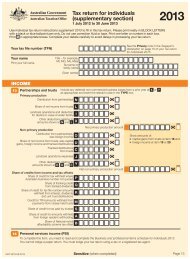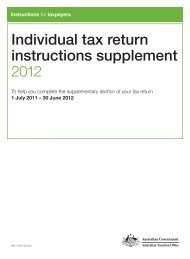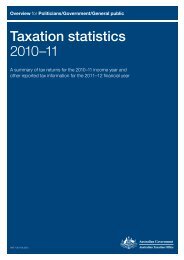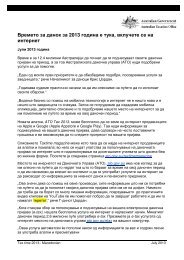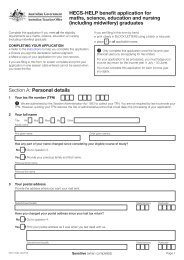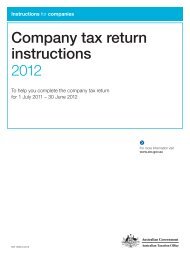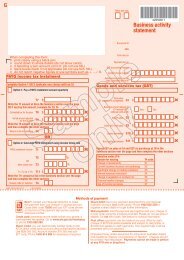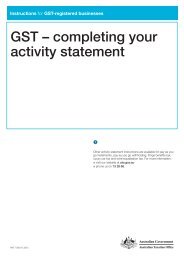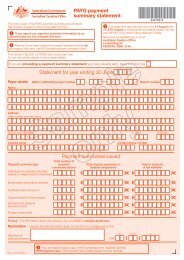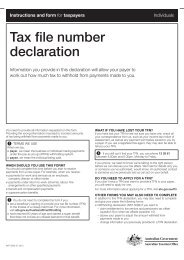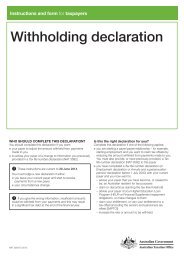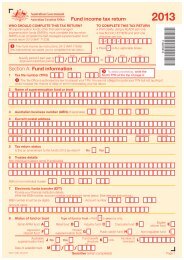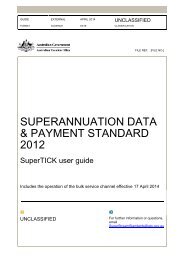Guide to depreciating assets 2013 - Australian Taxation Office
Guide to depreciating assets 2013 - Australian Taxation Office
Guide to depreciating assets 2013 - Australian Taxation Office
You also want an ePaper? Increase the reach of your titles
YUMPU automatically turns print PDFs into web optimized ePapers that Google loves.
of feasibility studies, market research or setting up thebusiness entityn as a shareholder, beneficiary or partner <strong>to</strong> liquidate orderegister a company or <strong>to</strong> wind up a trust or partnership(and the company, trust or partnership must have carriedon a business).If you incur expenditure for your existing business, abusiness that you used <strong>to</strong> carry on or a business that youpropose <strong>to</strong> carry on, the expenditure is deductible <strong>to</strong> theextent the business is, was or is proposed <strong>to</strong> be carried onfor a taxable purpose.You cannot deduct expenditure for an existing businessthat is carried on by another entity. However, you can deductexpenditure you incur for a business that used <strong>to</strong> be, or isproposed <strong>to</strong> be, carried on by another entity. The expenditureis only deductible <strong>to</strong> the extent that:n the business was, or is proposed <strong>to</strong> be, carried on fora taxable purpose, andn the expenditure is in connection with your derivingassessable income from the business and the businessthat was carried on or is proposed <strong>to</strong> be carried on.A five-year straight-line write-off is allowed for certain capitalexpenditure incurred <strong>to</strong> terminate a lease or licence if theexpenditure is incurred in the course of carrying on a business,or in connection with ceasing <strong>to</strong> carry on a business. Seethe details under Change 3 in the fact sheet Blackholeexpenditure: business related expenses, at a<strong>to</strong>.gov.auIf you are an individual operating either alone or inpartnership, this deduction may be affected by thenon‐commercial loss rules; see <strong>Guide</strong> <strong>to</strong> non‐commerciallosses, at a<strong>to</strong>.gov.auEXAMPLERalph decides <strong>to</strong> start carrying on his existing businessthrough a company. The business will continue <strong>to</strong> becarried on for a taxable purpose. Ralph will be the onlyshareholder of the company and he will be entitled <strong>to</strong>receive all the profits from the business. He incurs expenses<strong>to</strong> incorporate the existing business. Legally, Ralph and thecompany are separate entities. However, Ralph can deductthe incorporation expenses (subject <strong>to</strong> non-commercialloss rules). This is because the expenditure is in connectionwith the business proposed <strong>to</strong> be carried on by thecompany and the expenditure is in connection with hisderiving assessable income from the business.The extent <strong>to</strong> which a business is, was or is proposed <strong>to</strong> becarried on for a taxable purpose is worked out at the time theexpenditure is incurred. For an existing business or a businessproposed <strong>to</strong> be carried on, you need <strong>to</strong> take in<strong>to</strong> account allknown and predictable facts in all years.For a business <strong>to</strong> be ‘proposed <strong>to</strong> be’ carried on, you need<strong>to</strong> be able <strong>to</strong> sufficiently identify the business and there needs<strong>to</strong> be a commitment of some substance <strong>to</strong> commence thebusiness. Examples of such a commitment are establishingbusiness premises, investment in capital <strong>assets</strong> anddevelopment of a business plan. The commitment must beevident at the time the expenditure is incurred. It must alsobe reasonable <strong>to</strong> conclude that the business is proposed <strong>to</strong>be carried on within a reasonable time. This time may varyaccording <strong>to</strong> the industry or the nature of the business.The deduction cannot be claimed for capital expenditure<strong>to</strong> the extent <strong>to</strong> which it:n can be deducted under another provisionn forms part of the cost of a <strong>depreciating</strong> asset you hold,used <strong>to</strong> hold or will holdn forms part of the cost of landn relates <strong>to</strong> a lease or other legal or equitable rightn would be taken in<strong>to</strong> account in working out an assessableprofit or deductible lossn could be taken in<strong>to</strong> account in working out a capital gainor a capital lossn would be specifically not deductible under the incometax laws if the expenditure was not capital expendituren is specifically not deductible under the income tax laws fora reason other than the expenditure is capital expendituren is of a private or domestic naturen is incurred for gaining or producing exempt income ornon‐assessable non-exempt incomen is excluded from the cost or cost base of an asset because,under special rules in the UCA or CGT regimes respectively, thecost or cost base of the asset was taken <strong>to</strong> be the market valuen is a return of or on capital (for example, dividends paidby companies or distributions by trustees) or a return ofa non‐assessable amount (for example, repayments ofloan principal).If the expenditure arises from a non-arm’s length dealing andis more than the market value of what the expenditure was for,the amount of the expenditure is taken <strong>to</strong> be that market valueinstead.You deduct 20% of the expenditure in the year you incur itand in each of the following four years.Even if the business ceases or the proposed business doesnot commence (for example, if there is an unforeseen changein circumstances) the deduction may be able <strong>to</strong> be claimedover the five years. Deductions for expenditure for a proposedbusiness can be claimed before the business is carried on.However, if you are an individual taxpayer, the non‐commercialloss rules may defer your deductions for pre‐and post‐businessexpenditure; see <strong>Guide</strong> <strong>to</strong> non‐commercial losses,at a<strong>to</strong>.gov.auA recoupment of the expenditure may be included in yourassessable income.SMALL BUSINESS ENTITIESFrom the 2007–08 income year the simplified tax systemprovisions have been replaced with new streamlinedprovisions for small business entities. The concessions thatwere available under the simplified tax system have, in effect,carried over <strong>to</strong> the new rules. This means that you can gainaccess <strong>to</strong> the concessions that were previously available <strong>to</strong>you as a simplified tax system taxpayer if you meet the newsmall business eligibility criteria.For more information, see <strong>Guide</strong> <strong>to</strong> small business entityconcessions, at a<strong>to</strong>.gov.au32 a<strong>to</strong>.gov.au GUIDE TO DEPRECIATING ASSETS <strong>2013</strong>



